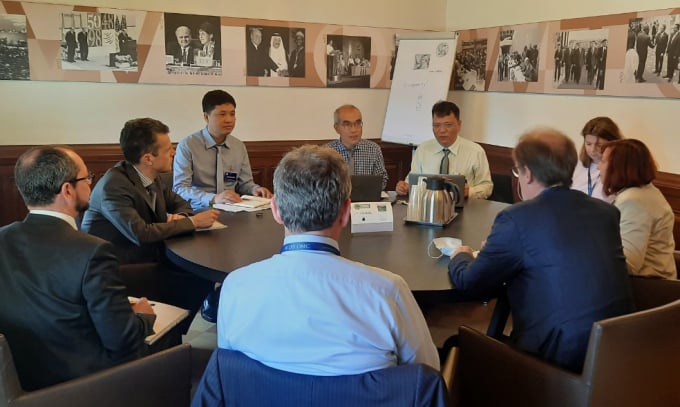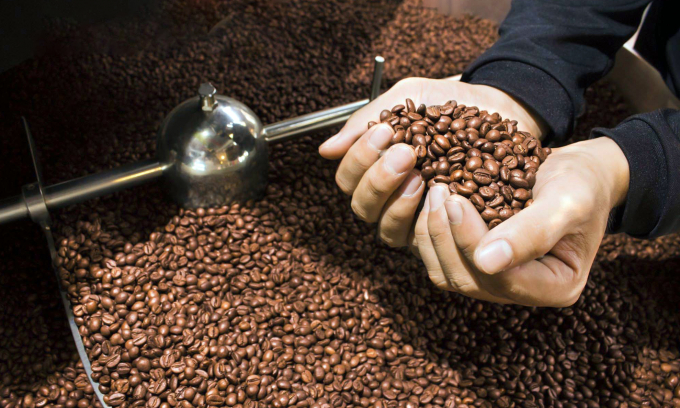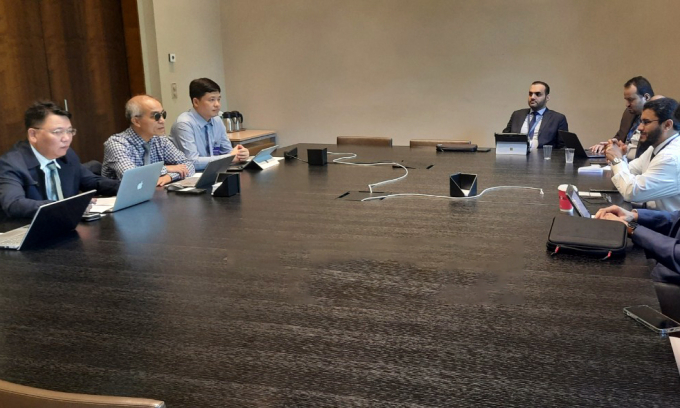November 25, 2025 | 08:29 GMT +7
November 25, 2025 | 08:29 GMT +7
Hotline: 0913.378.918
November 25, 2025 | 08:29 GMT +7
Hotline: 0913.378.918

Overview of the working session between the delegations of Vietnam and the EU.
On June 23rd (Geneva time, Switzerland), the delegation of Vietnam including the representative of the Permanent Delegation of Vietnam to the United Nations and the representative of the Ministry of Industry and Trade (led by Vietnam SPS Office) along with World Trade Organization (WTO) and other international organizations in Geneva held a bilateral meeting with the EU. This was a side event of the 83rd session of the WTO-SPS Committee taking place from June 22-24.
At the meeting, Dr. Ngo Xuan Nam, Deputy Director of SPS Vietnam Office, Head of the Vietnam Delegation, proposed the EU remove dragon fruit, coriander, basil (sweet), mint, parsley and okra from the list of products temporarily established practical identity inspection frequency.
The Vietnam delegation also demanded the EU review and provide data on the non-compliance rate of instant noodles related to the Ethylene oxide residue standards (from January 2022 to the present date).
Based on the assessment of compliance frequency to requirements and regulations on Ethylene oxide residues in the control process of businesses, the delegation proposed the EU side consider and remove control measures as prescribed to lessen the difficulties Vietnamese export enterprises were facing.
Apart from instant noodles, issues concerning the inspection frequency of dragon fruit and spices were also raised by the Vietnam delegation during the working session.
Dr. Ngo Xuan Nam said that there were no shipments of dragon fruits in 2021 that did not comply with EU SPS regulations. And in 2022 there had only been two consignments not conforming to regulations, including one consignment of "reduced organoleptic quality" and one consignment of excess Dithiocarbamate residues. It thus could be seen that Vietnam had performed quite well in controlling MRLs with pesticide residues.
“Dragon fruit is a signature agricultural product of Vietnam because it is grown in good soil and climate conditions, hence the outstanding quality. Vietnam attaches great importance to the quality and SPS issues of exported food in general and dragon fruit in particular. The government and relevant agencies of Vietnam have had many guidelines and policies related to this matter,” said Mr. Nam.

Among the main agricultural products exported to the EU in 2021, coffee occupies the highest proportion of 42.2%, next is cashew nuts with 33%. Rubber, vegetables and pepper together account for 7%.
Having listened to comments from the Vietnam side, Dr. Lorenzo Terzi, Head of EU Negotiating Delegation in the WTO-SPS Committee, said that the technical departments of Vietnam and the EU under the EVFTA needed coordination in reviewing statistics on EU warnings for Vietnam’s agricultural products. This would serve as a basis to reduce the frequency or even cancel inspections for Vietnam’s agricultural products.
“The EU side highly appreciates this working session, and if the Vietnamese side has statistical data on activities as well as cases of good compliance with SPS regulations, it can send it to the EU for reference,” said Dr. Terzi.
Benefiting from the EVFTA, Vietnam had been identified by the EU as a partner of priority. On that basis, the EU agreed that the contact points for the implementation of SPS commitments, in accordance with the spirit of the agreement, were the Vietnam SPS Office and the European Union Delegation to Vietnam. They would become a bridge to promote agricultural trade between the two sides.
The EU also suggested Vietnam review the application dossiers for opening the market for some products into Vietnam and go into further detail about regulations on food additives.
Periodically every six months the EU would review the list of food and feed products from third countries subject to the temporary strengthening of official controls at border checkpoints to ensure food safety. The next review would take place in December 2022.

Working session between the delegations of Vietnam and Saudi Arabia.
Also on June 23, the Vietnam delegation held a bilateral meeting with Saudi Arabia. The content of the meeting was about how to organize and inspect Vietnam's pangasius food safety and quality management system. The Vietnam delegation worked with Brazil on aquatic food additives, heat treatment regimes for processed shrimp; Pakistan on regulations for Aflatoxin in tea; the United Kingdom on the clarification of the new phytosanitary certificate form.
Translated by Samuel Pham

(VAN) Viet Nam is entering the pivotal period of 2025-2030, moving toward the formulation of the Remote Sensing Law, which will establish a legal foundation for the development of national digital data.

(VAN) The agricultural sector is finalizing the strategic framework for emission reduction, setting the goal of sharply cutting methane and 403.7 million tons of CO2 equivalent and moving toward Net Zero by 2050.
/2025/11/22/2236-1-153832_483.jpg)
(VAN) The National Marine Spatial Planning is opening up opportunities for sustainable blue sea development across 21 coastal localities.

(VAN) Viet Nam’s forestry sector is undergoing a comprehensive transformation, strengthening management, protection, and development efforts to maintain ecological security and drive green, sustainable growth.

(VAN) Viet Nam is accelerating efforts to digitize reservoir operations, from real-time data to hydraulic modelling.
/2025/11/21/3348-2-102623_454.jpg)
(VAN) National Assembly delegate Nguyen Thi Lan has proposed adding special mechanisms to attract human resources to the agricultural, forestry, and fishery sectors, addressing the shortage of high-quality personnel.

(VAN) Over the past two decades, the unified legal framework for water resource management has been perfected, becoming a crucial foundation for ensuring national water security.